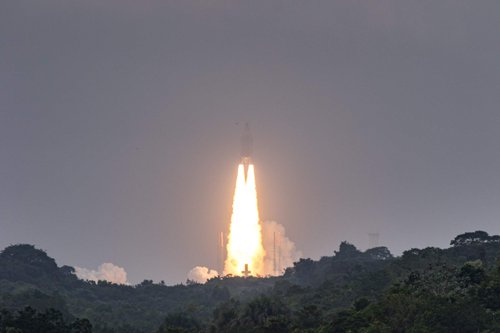SOURCE / INDUSTRIES
Galileo system’s woes may provide opening for China’s BeiDou

Four Galileo satellites are sent to the space in French Guiana in December 2017. Photo: VCG
The breakdown of the Galileo navigation satellite system over the weekend has triggered users' concern about the service, and it could bring opportunities to China's navigation satellites to serve European clients, analysts said.
The entire Galileo system suffered an unexpected signal outage beginning on Thursday, July 11 at 1 am Coordinated Universal Time, (9 am Beijing time).
A note posted on gsc-europa.eu, the official website of the European Global Navigation Satellite Systems Agency, showed that 22 of the 24 satellites remain "not usable" as of press time, and the status of only two satellites was shown as "testing."
The signal outage has persisted for more than three days and as yet no word has been given on the cause or how long the outage will last.
"It is a breakdown of the entire system," an anonymous insider who is close to the navigating system told the Global Times on Sunday. "Although the system is still in the initial stage, it is the first time to see such a big incident lasting for such a long time," he added.
Galileo is Europe's Global Navigation Satellite System (GNSS), providing satellite positioning services and timing information with positive implications for many European users, according to official website.
As one of four GNSS in the world, it aims to establish Europe's own satellite navigation system. The system completed its first satellite launch in 2011 and plans to deploy 30, which will be completed in 2020.
"It's an opportunity for China to promote the coverage of the BeiDou Navigation Satellite System (BDS)," another insider from the downstream business of BDS told the Global Times on Sunday.
"We have an increasing number of satellites and experts. If the BDS succeeds in entering the European markets, it will be helpful to enhance China's confidence in competing with the GPS system in other developed markets," he added.
However, there will be challenges. For example, the US is likely to attack China's satellite positioning system, making it a national security issue.
China began to construct its BDS navigation system in the 1990s. It started serving China with its BDS-1 system in 2000 and started serving the Asia-Pacific region with its BDS-2 system in 2012.
In May this year, China sent a new satellite of the BDS into space. China will complete the BDS global navigational network by 2020.
"It is no doubt negative news for any satellite service provider if it can't provide services to its users, and if the outage frequency is high, it could even hurt the service's confidence in the market," Li Nan, marketing director of Beijing BDStar Navigation Co, told the Global Times on Sunday.
However, he added that at present, GNSS have achieved compatibility, which can provide all-weather, all-day navigation services for the public. "Compared with the early GPS system alone, the current multi-satellite navigation system including BeiDou provides users with better reliability," Li added.

